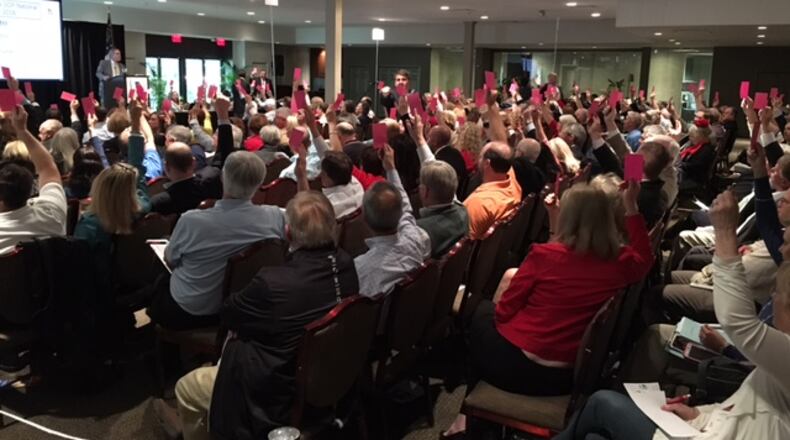Republicans
Georgia has 76 delegates to the Republican National Convention, out of a total of 2,472. Forty-two were tapped at congressional district GOP conventions in April, 31 will be elected at June's state Republican Party convention in Augusta and then there are Georgia's three Republican National Committee members.
The delegates lean toward insiders: People who have spent years within the party apparatus, running for office, raising money, knocking on doors for candidates. They are picked by a much smaller and more committed group than voted in the statewide primary. Statewide delegates are elected by state convention delegates, who themselves were elected at GOP county conventions.
When the delegates arrive in Cleveland in July for the convention, they will be legally bound to support a certain candidate on the first ballot, based on Georgia's vote in the March 1 primary. Given the candidates' performances statewide and within 14 congressional districts, Donald Trump will get 42 first-ballot delegates from Georgia, Ted Cruz will get 18 and Marco Rubio will get 14. Even though Rubio has dropped out of the race, he has petitioned to keep his bound delegates – who can be used as bargaining chips.
Where it gets interesting is if Trump does not earn 1,237 delegates on the first ballot. Then each delegate can vote as he or she sees fit.
The better-organized Cruz campaign has worked to undermine Trump’s support on subsequent ballots by inserting loyalists within the state delegations, but an outcome beyond the first ballot is exceedingly hard to predict.
Democrats
Georgia has 117 delegates to the Democratic National Convention, out of a total of 4,765. The 102 pledged delegates include 67 elected at April caucuses in each congressional district; 13 state and local leaders and officeholders; and 22 at-large delegates elected by the state party committee.
All sign pledges to support a certain candidate in Philadelphia in July. The presidential campaigns can review and approve the delegates assigned to them, reducing the chances of double agents as seen on the GOP side.
Clinton’s dominant win on March 1 gave her 73 pledged delegates from Georgia, to Bernie Sanders’ 29.
The remaining 15 are "superdelegates," national party leaders, federal officeholders and other insiders who can vote as they like – and have mostly lined up behind Hillary Clinton in public.
In the two-person race, a multiple-ballot convention is exceedingly unlikely, meaning that the fight to sway delegates focuses on the superdelegates. As the Vermont senator trails, Sanders’ team has been making its case to sway Clinton loyalists and others who have not publicly picked a candidate. How much power do Georgia’s delegates to the RNC and DNC have and what rules do they follow
About the Author
The Latest
Featured


